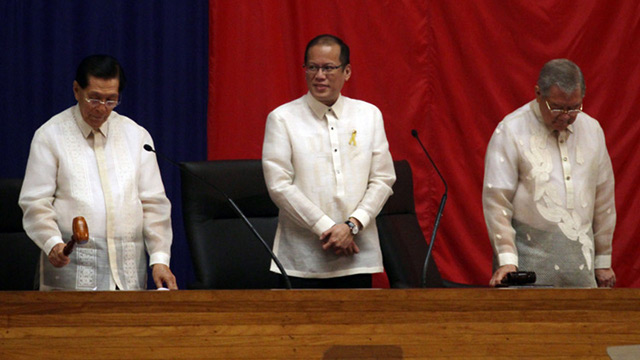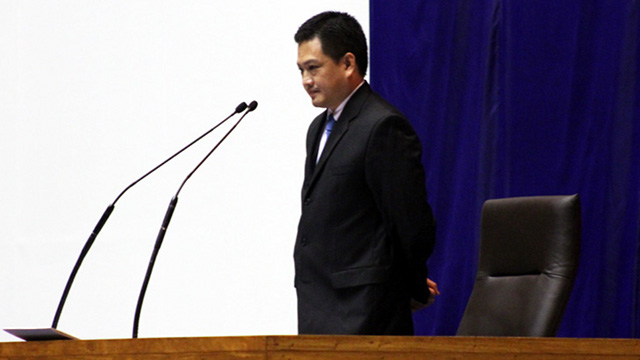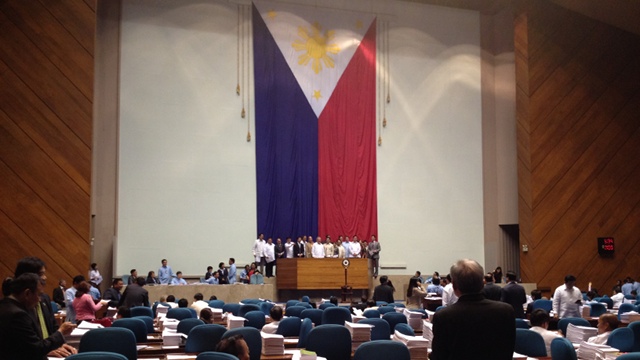SUMMARY
This is AI generated summarization, which may have errors. For context, always refer to the full article.

MANILA, Philippines – Despite the supposed separation of powers between Malacañang and Congress, the reality is Philippine presidents have tremendous power over the legislative process. This is more pronounced in the House of Representatives because it is historically packed with administration allies.
It’s an open secret, for example, that President Aquino gave the marching order to pass the “sin tax” measure in the House despite the strong lobby from tobacco companies and the politicians who have protected them for decades.
Because of the Solid North – a political bloc of politicians coming from the tobacco-growing provinces – the House of Representatives is said to be the more difficult battleground for the sin tax measure. But La Union Rep Victor Ortega, who had led the Solid North in blocking attempts to raise taxes on cigarettes for about a decade, was reduced to a helpless politician on June 6 when he tried but failed in his last-ditch attempt to further dilute the measure.
In the Senate, committee on ways and means chairman Sen Ralph Recto said they will begin hearings on the Sin Tax bill on Thursday, August 9. He expressed confidence that the Senate can pass the measure between October and November, before the Senate shelves all other bills to prioritize deliberation on the 2013 budget.
If the House version of the Sin Tax bill is passed into law, it would result in at least P30-billion additional revenue for government. President Aquino wants this to fund his ambitious universal healthcare coverage program.
The same marching orders were given when Congress passed the highly divisive bill postponing the 2011 Autonomous Region in Muslim Mindanao (ARMM) elections, and the successful impeachment of former Ombudsman Merceditas Gutierrez and former Chief Justice Renato Corona, according to lawmakers interviewed by Rappler.
With the marching orders came persistent rumors of pork barrel being dangled to lawmakers. Reports of LP secretary-general and House committee on appropriations Rep Joseph Emilio Abaya threatening lawmakers with “zero” pork barrel if they did not join the impeachment move were prevalent at the height of moves to oust Gutierrez, for example. Abaya and his allies in Liberal Party have denied it.
Where’s the marching order?
With such display of political will, how come President Aquino is not as aggressive in pushing for his other priority bills?
Case in point: the Reproductive Health bill (RH bill). He declared it a priority bill in August 2011. He also mentioned it in his State of the Nation Address (SONA) on July 23.
Presidential spokesperson Edwin Lacierda interpreted it as President Aquino’s marching order to the lawmakers. “We hope that the congressmen will note of the comment made by the President,” he was quoted saying.
But lawmakers don’t interpret marching orders. They get them in clear sentences.
How?
According to lawmakers, in case of an urgent measure that the administation wants passed, House Speaker Feliciano “Sonny” Belmonte would call for a caucus among leaders of the House majority coalition – composed of the ruling Liberal Party (LP), the Nationalist People’s Coalition (NPC), Nacionalista Party (NP), National Unity Party (NUP), and various party list representatives. In that caucus, he issues the marching order. It becomes the task of the party leaders to send the message to the party members.
Navotas City Rep Toby Tiangco explained this lengthily before the Senate impeachment court during the trial of Corona.
Together and acting on specific orders, the House majority coaliton can do anything.
With new members joining the LP bandwagon, President Aquino’s political party now has 88 members in the House of Representatives. On the other hand, its coalition partners — the NPC, NP, and NUP — have 46 members, 27 members, and 28 members, respectively.
These form a potent 189 combined votes out of the total 231 district representatives in the House. Almost all of the 56 party list representatives are also a part of the majority coalition.
The House minority coalition, on the other hand, has 28 members. Only a few House members are considered independent.
Emboldened Church
It is this absence of a “marching order” from the President on the RH bill that has prompted political parties to go their own way on this measure. Invoking “conscience votes,” leaders of the majority coalition, including the President’s own party, will not vote as one.
When the lower House puts the RH bill to a vote on Tuesday, August 7, party leaders said it is going to be a ‘conscience vote’ for everybody. (The issue to be raised on August 7 will be whether or not the House should prolong its debates on the matter or move it to the second phase of bill amendments. Anti-RH bill advocates prefer prolonged debates.)
Other political parties in the House of Representatives have also declared that they will not order their members to vote for or against House Bill No. 4244 or the consolidated Reproductive Health bill (RH bill).
NP stalwart Cavite Rep. Jesus Crispin “Boying” Remulla conceded that House members are feeling the pressure from religious groups, which consider the bill as a violation of Catholic tenets. “It has become a local matter to many because of the pressure from the religious community,” he told Rappler.
All these have apparently emboldened the Catholic Church to further lobby against it. Bishops have made calls to lawmakers and on Saturday, August 4, about 10,000 Catholics braved the rain on Edsa to stage a protest rally against the bill.

Will the President insist on his silent support for the controversial measure?
House majority leader Rep Neptali Gonzales II told a radio interview Sunday, August 5, that the President has invited to Malacañang all members of the House for a Monday, August 6, meeting. “The President wants to share with them his views on reproductive health,” Gonzales said in Filipino.
Lambasted in the Church rally, will the President now flex his political muscle and issue a clear marching order for the controversial bill to progress to the next legislative phase? It remains to be seen.
RH bill critic House minority leader and Quezon Rep Danilo Suarez is afraid of President Aquino’s marching orders on the RH bill. “There should be no marching order from the administration because honestly, I’ll be scared if the administration issues a marching order,” he said.
Aside from a clear marching order, there’s a more obvious move that distinguishes a truly prioritized bill from the rest. President Aquino certifies them as urgent.
The Sin Tax measure and the postponement of the ARMM elections were both certified by Malacañang as urgent bills. Because of this, Congress took only 3 months – March 2011 to June 2011 – to debate and pass the very controversial and highly divisive postponement of the polls. It also took the plenary less than a month – February 9 to June 6 – to debate and pass the the Sin Tax Bill..
In comparison, the RH bill was sent for plenary debates in January 2011. After one year and 6 months, it remains stuck in the period of debates.
Thank Belmonte for finally putting the bill to a vote. In the Senate, Senate President Juan Ponce Enrile said he feels no need to rush the bill.
Succumbing to Church pressure
There is no doubt that President Aquino is convinced that an RH bill is necessary. During the 2010 presidential campaign, he delivered fiery speeches supporting the RH bill.
He was quoted in an October 2009 www.inquirer.net column as saying: “I don’t care if the Catholic Church will abandon me because of my support for the ‘reproductive health’ bill. I cannot allow a church-run state. The church teaches me that I will follow my conscience. My conscience tells me that we have an overpopulation problem. I have to address it; we need to control the population. We must ensure full availability of contraceptives.”
But he got burned and succumbed to pressures from the Catholic Church, whose bishops threatened to campaign against him. After a series of dialogues with Catholic bishops at the height of the campaign, President Aquino softened his stand on RH bill.
It was during the campaign period that the phrase “responsible parenthood” was coined — in a move to appease the Catholic Church. But then and now, few RH bill advocates were really satisfied with his half-baked position.

RH better off than other priority bills
But the RH bill is better off than the other “priority bills” of President Aquino.
Last year, he convened two meetings of the Legislative Executive Development Advisory Council (LEDAC), the body formed to serve as a venue for Malacañang to seek Congress support for the administration’s priority programs.
In the February 2011 and August 2011 meetings, President Aquino identified 26 total priority measures. Out of this 26, only 4 have become laws, based on data from the Presidential Legislative Liason Office (PLLO) as of July 31, 2012.
These are the laws postponing the elections in the Autonomous Region in Muslim Mindanao, lifting night work ban for women, requiring 5-year-old children to take up Kindergarten, and the GOCC Governance Act of 2011.
One measure, the Data Privacy Act, has been trasmitted to Malacañang for President Aquino’s signature.
As expected, the administration-dominated House of Representatives is making more progress than the Senate.
In the Senate, 3 of the remaining bills have been approved on 3rd reading, two are pending approval on 2nd reading, and 14 are still pending in various committees for approval on 1st reading.
No bills were filed for two priority measures: amendments to the Human Security Act and amendments to the Lina Law (on urban poor settlers).
In the House of Representatives, 10 of the remaining bills have been approved on 3rd reading, one is approved on 2nd reading, 3 are pending approval on 2nd reading, and 6 are pending in various committees for approval on 1st reading.
No bill was filed for one priority measure: amendments to the Human Security Act.
Running out of time
With less than a year before the next elections, the chances of getting the remaining bills passed are getting smaller.
Gonzales has been honest about the House schedule. For the RH bill or any other bill to have a chance, he said it has to be passed within the month August.
By September, the 2013 budget will reach the plenary. Gonzales said the House will prioritize budget deliberations so they can meet their target of sending it to the Senate before they go another long break in October for the filing of certificates of candidacies. (President Aquino has consistently passed the budget on time.)
It will be difficult to tackle bills after October because by then politicians will be busy on their election bids, Gonzales added.

Heartache of FOI advocates
The freedom of Information (FOI) bill is a special case. Why it’s not a priority bill is curious.
One, the Aquino government promotes transparency in the bureaucracy. Two, when he was a senator President Aquino voted to pass the FOI bill in the 14th Congress.
In the 14th Congress, FOI was only two short steps away from becoming a law: its ratification in the House of Representatives and President Arroyo’s signature.
But President Aquino had a change of heart on the FOI bill.
“You know, having a freedom of information act sounds so good and noble but at the same time—I think you’ll notice that here in this country—there’s a tendency of getting information and not really utilizing it for the proper purposes,” President Aquino was quoted in the story of Philippine Daily Inquirer October last year.
But while it is not a priority bill, Malacañang has drafted its own version of the FOI bill. Like the RH bill, it is President Aquino’s spokespersons that have been more vocal about supporting the FOI.
This is the heartache of FOI’s prime mover in Congress – President Aquino’s fellow LP member and Quezon Rep Lorenzo “Erin” Tañada. In the current 15th Congress, the FOI remains in the commitee on public information, the first stage of the legislative mill.
What the President wants, he gets
Commitee chairman Samar Rep Rep Ben Evardone originally planned planned to put the bill to a vote on August 7, but he said Belmonte asked him to reschedule. Belmonte wants to hold a caucus first.
“The House majority coalition leaders want to hold a majority caucus on the issue,” Evardone said.
It is not clear why a caucus is needed before the committee can approve the FOI bill. But a caucus can be a good sign.
Remember the December 11, 2011 all-member caucus of the House majority coalition at the Rolando Andaya Hall? In that caucus, the House leadership was able to get an overwhelming 188 votes to impeach former Chief Justice Renato Corona.
Lack of time has never been a problem for a committed President. It took the lower House 5 hours to collect the anti-Corona signatures. Because President Aquino wanted it, the lawmakers lined up inside Andaya Hall to sign the complaint.
The question for the RH bill, FOI and other supposedly priority bills is: Will the marching orders come at all?
(UPDATE: On August 6, the House of Representatives voted to terminate the period of debates a few hours after President Aquino called the lawmakers to a caucus in Malacañang. During the caucus, the President made an “appeal” to end the debates. The House leadership is yet to hold a caucus to dicuss the FOI bill.) – Rappler.com
Add a comment
How does this make you feel?

There are no comments yet. Add your comment to start the conversation.